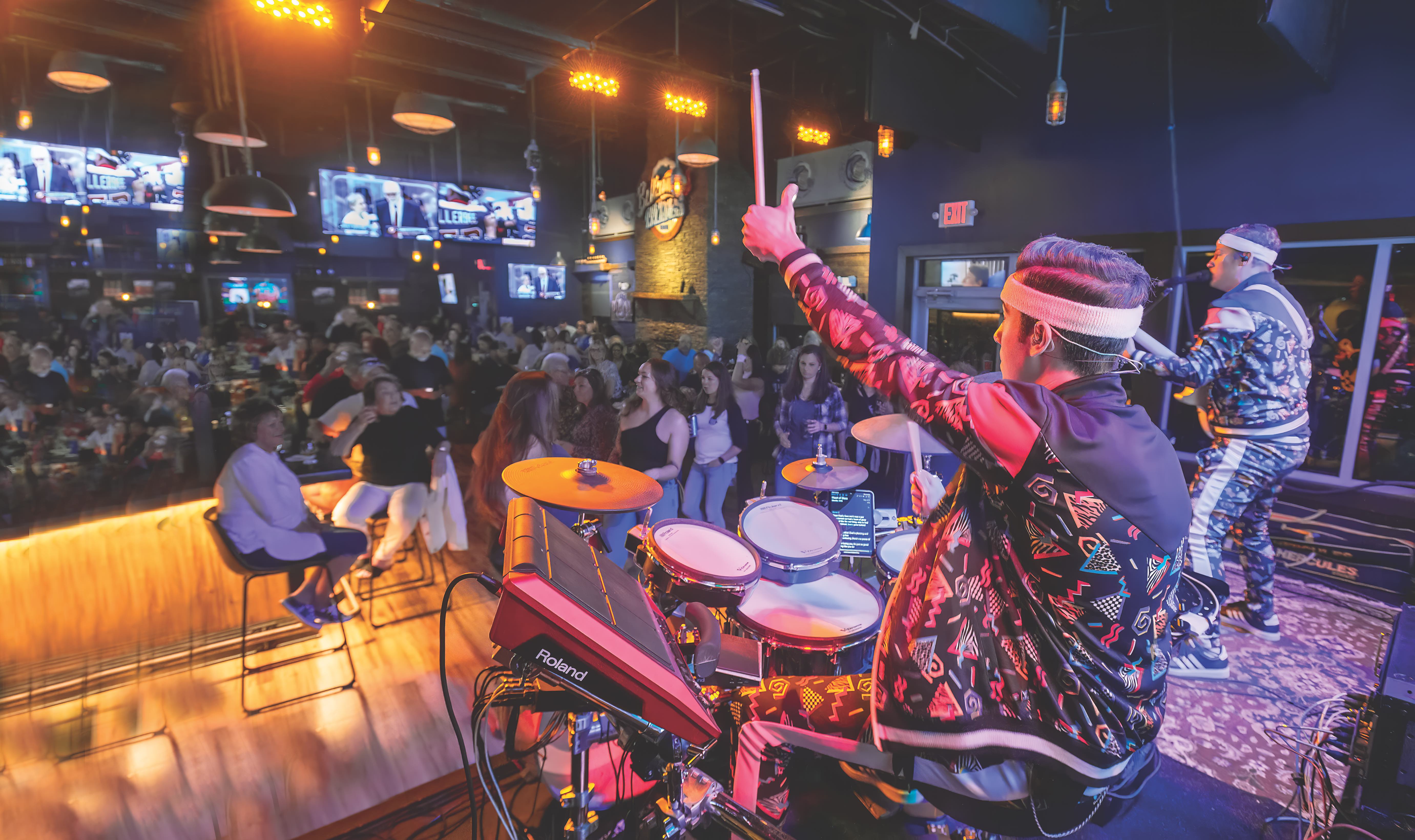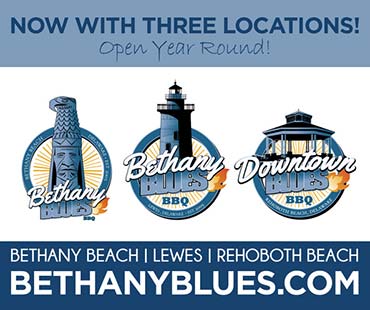
Demand for live entertainment is high in coastal Delaware. These musicians are answering the call.
By Pam George
Photograph by Scott Nathan
From the July 2023 issue

When Jake Banaszak and B.J. Muntz moved from New Castle County to coastal Delaware in 2004, they planned to stay only for the summer. The musicians were looking for gigs, and they’d spotted an increased demand for bands at the beach. The relocation was well worth it. “We never left,” Banaszak says.
Their band, Lower Case Blues, is playing six nights a week this summer — one less than in 2022 because everyone needs a break, Banaszak says. “There’s no shortage of work, that’s for sure.”
Lower Case Blues isn’t the only group with a packed schedule. The Hot Sauce Band, known for its very lively, mostly instrumental music with a Latin flair and unexpected song choices, performs up to 11 times a week, according to percussionist Michael Shockley. His brother, Ed, is equally busy playing with The Funsters and Vinyl Shockley, among several others.
So, can a musician earn a living at the beach? It depends on your definition of “earn a living” — and your ability to hustle. Even the busy Shockley brothers have other endeavors. Ed sells antiques, and Michael and his wife, Susan, run a fashion-distribution business and retail store.
But one thing is certain: There are numerous opportunities for versatile performers. Roger Hillis, a columnist who writes about local music, says the scene is “eclectic,” and he should know, given he performs with the dance party band Freshly Squeezed as well as Braxton Hicks, which plays originals.
A main attraction
Live entertainment has long been a cornerstone of the Delaware beach experience, with Dewey Beach at the hub. That is still the case. For instance, on summer weekends, Jimmy’s Grille has up to four acts daily, while Northbeach has three. The Rusty Rudder features two acoustic acts, two DJs and a band. “There’s plenty of room and plenty of talent,” says Vikki Walls, who books musicians for the Highway One hospitality group, which owns these Dewey Beach establishments and the Bottle & Cork.
But live music isn’t limited to Dewey. For example, Irish Eyes Pub & Restaurant in Milton and Lewes host solo acts, including crooner Bryan Clark and the Mathew Street Band, which plays classic rock.
No matter the location, entertainment appeals to tourists who want to enjoy the area’s nightlife or spend a rainy afternoon listening to music. The weekly ebb and flow of vacationers gives artists a rotation of fresh faces in the audience.
“I love the tourist season,” Banaszak says. “We’re playing a room, and you never know who’s going to be there — the local crowd, the people who follow us all the time or a lot of new people from Pennsylvania, New York, New Jersey and Virginia.”
The interest in live music spiked in late 2021 and 2022 as audiences sought to shake off the lingering effects of COVID-19 restrictions. Hillis predicts that 2023 will outshine the previous two. “On a national level, you see Taylor Swift, Metallica and Bruce Springsteen playing two nights at football stadiums — [they sell out] no matter how expensive the tickets are,” the columnist notes.
While the Boss isn’t popping into the Bottle & Cork anytime soon, some shows at the iconic Dewey venue and the Freeman Arts Pavilion near Selbyville have sold out shortly after the box offices opened, Hillis says. Smaller venues have crowded entertainment calendars to satisfy the demand.
Glory days
If there’s a common thread at many beach venues, it’s the color of the audience’s hair. There’s a sea of silver when a tribute band plays at the Freeman pavilion or the Milton Theatre. You’ll even spot baby boomers at the Rusty Rudder, where they probably partied while in college. “If somebody asked me who goes there, I’d say anyone from 21 to 70,” says Chris Maliszewski, the longtime sound engineer for the Dewey Beach restaurant and other venues, including Bethany Blues.
The older audience’s numbers are growing, thanks to residents in the area’s new communities. These retirees want to rock on the dance floor, not on a front porch. “They want to hear songs from their golden years that make them feel good,” agrees Ed Shockley, who can relate. A founding member of Jack of Diamonds, which gained fame outside of Delaware’s borders, the Lewes native moved to Manhattan in 1983 to join the band Cries. His brother, Michael, and Keith Mack (from Rehoboth Beach) later joined him.
When Shockley moved back to Lewes to raise his family, he teamed up with other musicians who’d returned to the coastal fold. “That’s how The Funsters evolved,” he explains. “We got together just for the fun of it, and the band became popular.”
Initially, the players didn’t consider themselves a dance band. After all, ’70s influences include “deep cuts,” perhaps best enjoyed while wearing headphones and sniffing patchouli. Think Pink Floyd and Emerson, Lake & Palmer. But The Funsters give resort audiences what they want — a song with a beat. “People like to dance,” Shockley says simply.
Admittedly, the definition of “oldies” has evolved as vacationers and residents have aged. Forget the fabulous ’50s; the duo Decade80 plays the music people now in their 50s and 60s will remember. Although born in 2000, frontman and drummer Justin Fisher fell in love with ’80s music and culture after watching the movie “The Wedding Singer.”
“I knew long before Decade80 was a thought that if I were to undertake another musical project, it would be an ’80s band,” he says. “I even had the band name and website well over two years before the band’s inception.”
Fisher and guitarist Taylor Knox have kept boomers and Generation X on their feet one to three nights a week, including a residency at Nalu Surf Bar & Grill in Dewey every Saturday.
Coloring outside the lines
While some attendees expect strict interpretation, others appreciate creative license. Enter Lower Case Blues. “If we play a cover — like a Buddy Guy tune — we do it our way,” Banaszak says. “We don’t try to sound like anybody else. We just do what we do.” And what they do is play the blues, which plugs a niche in coastal Sussex County.
To be sure, there’s more than rock and pop at the beach. Consider the Rehoboth Beach Jazz Festival and the True Blue Jazz Festival, both of which take place in the fall. Ken Schleifer, a retired music educator, is a member of the jazz group 5th Avenue. However, the versatile percussionist also backs up the 100-member CAMP Rehoboth Chorus and plays with the Coastal Ringers, a handbell group that can chime “Africa” by Toto.
Along with the variety of music, there is a mixture of places in which to experience it. For instance, you might hear Lower Case Blues and 5th Avenue at The Room at Cedar Grove, west of Midway. Musician Paul Cullen founded the event venue to showcase a range of local, regional and national acts, including blues guitarist Gabe Stillman, local chanteuse Libby York and singer-songwriter Lauren Calve.
The Room is also a refuge for musicians who want to play original music, which can be a hard sell in Delaware establishments that cater to tourists. “I don’t have an original music thing going on,” says Walls, who books Dewey Beach hotspots.
The Room charges for admission, which means the audience is invested — the music isn’t the background to a family outing, happy hour meet-up or meal. “You come there for the music; it’s a whole different vibe,” Banaszak explains. “You know, there are no TVs on.” Indeed, Cullen has asked chatty guests to pipe down during performances, a request you won’t hear at The Starboard in Dewey Beach.
Cullen has taken matters into his own hands in more ways than one. For example, the guitarist-turned-chef added a one-man concert to the in-home dining experiences he provides. “I play out every night that I do an event,” says the former bass player for Bad Company. He’s also organized concerts with fellow artists for The Room and the Milton Theatre.
Parks and city bandstands also feature live music, and event directors like Julie Malewski, who books the Bethany Beach Bandstand, need diverse acts, including military bands. “We never have a shortage of people who want to play here, and once they do, they want to come back,” she says.
Competition for a calendar spot there is fierce, given bands only get one date. And the bandstand now only offers music one night a week instead of an entire weekend. (The boardwalk became too crowded during the season, Malewski explains.)
But for career performers, private gigs are the gold ring. “Private and corporate,” Michael Shockley confirms. “That’s where the money is.” Schleifer, who has played in country clubs, agrees. Plus, a club is more scenic than a bar, he adds.
Size and sound
Coastal clubhouses have room for a band with five or more members, which is not the norm in most area restaurants and bars. The exception is Bethany Blues and the Rudder, which can accommodate the traditional rock setup: bass, drum set, lead guitar, rhythm guitar and keyboards. Although Hot Sauce is a five-piece band, there’s no bass player or drum set. “We get away with it because we don’t have a big footprint,” Michael Shockley says of playing in cozier venues. Indeed, the group has even played at the Crooked Hammock Brewery outside Lewes, which typically books acoustic duos and trios.
Even before the coronavirus pandemic, many beach bars and restaurants began embracing what Hillis calls the “Key West tradition” of booking solo acoustic acts, which can fit into tight spaces and are typically more affordable. But there’s another reason why acoustic shows have become particularly appealing. Most municipalities have noise ordinances, and in-town restaurants might have decibel-sensitive neighbors. Hillis remembers when the Rehoboth Beach police ticketed a downtown club when he was playing.
A group’s size doesn’t necessarily mean it will be loud, says Maliszewski, the sound man. But musicians often don’t understand the venue’s dynamics or they refuse to adjust the levels. But when he supplies the sound equipment he can monitor — and control — the output.
Nevertheless, places like the Rusty Rudder take a progressive approach to sound and size. Solo acts, duos or trios kick off a weekend afternoon, and bands take the stage at night. Similarly, Paradise Grill in Long Neck starts the lineup with one-, two- and three-person acts.
Motivated musicians will perform with acts of varying sizes. “The guys that are really driven will play double and triple gigs a day during the summertime,” says Ed Shockley, who is in five bands and plays solo. “You can make decent money if you can pull that off.”
Speaking of money, since many restaurants and bars pay a flat fee, performers can make more if they play alone or with only one to two other people. Large bands have “a lot of mouths to feed,” Shockley notes. And that’s another reason why bands with five members or more prefer weddings and other private gigs with higher budgets.
A matter of time
No matter their size, acts start earlier than in the past. “I play maybe 240 shows a year, and I rarely play past 10 p.m.,” Michael Shockley says. “It’s wonderful for an old man like me.”
At Bethany Blues near Lewes, the music might start at 8 p.m. and end by 11, Maliszewski says. The first set often lasts 90 minutes. “As soon as you take a break, you might lose the crowd,” he explains. “Only a handful of bands draw people in the second set.”
Reasons for the earlier hours vary. For example, a restaurant might close at 10 or 11 p.m., regardless of the entertainment. In-town establishments might want to appease residential neighbors. But most agree that the age of the area’s audience is the primary factor. “Generally, people like to come out to a show earlier, particularly our crowd, who are a little older,” Banaszak says.
Interestingly, older residents influence the local scene in other respects. With time on their hands and savings in the bank, retirees with talent are willing to perform for a small fee or food and drinks. “They’re good — they’re just like us,” Ed Shockley says. “But it’s competition.”
These hobbyists are happy to find opportunities in their backyard, but most pros need to venture outside the coastal region, particularly in the off-season. “When you get into like January, February, March, it can be a little bit of a drag,” Banaszak admits. In February, Lower Case Blues tours Florida to maintain momentum.
Even with the increase in venues, it’s hard to earn a steady income by only focusing on the beach, Ed Shockley says. The trick is to book gigs in cities that don’t require an overnight stay, such as Baltimore, Annapolis and Washington, D.C. However, his brother adds, the tide has turned. He remembers when beach-based bands consistently headed north if they wanted to make enough money to survive. Now, like Lower Case Blues, regional performers are coming to coastal Delaware.
Says the music veteran: “We got the last laugh.”



